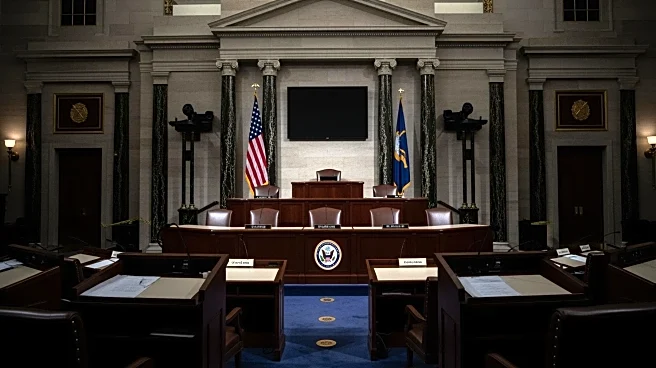What's Happening?
The U.S. Senate's attempt to pass a stopgap funding bill to end the partial federal government shutdown was unsuccessful on October 16, 2025. The bill, which aimed to restore government funding until November
21, was defeated in a 51-45 vote, falling short of the 60 votes required for passage. The shutdown began on October 1, marking the start of fiscal year 2026, after Senate Republicans were unable to secure sufficient Democratic support for a short-term funding measure. The deadlock primarily revolves around healthcare funding and tax credits for the Affordable Care Act, which are set to expire at the end of the year. Democratic lawmakers are pushing for the extension of these subsidies before the enrollment period begins on November 1, and are seeking assurances from the White House that spending agreed upon in any deal will not be unilaterally canceled.
Why It's Important?
The continuation of the government shutdown has significant implications for federal operations and services, affecting millions of Americans who rely on government programs and services. The deadlock over healthcare funding and tax credits for the Affordable Care Act highlights ongoing partisan divisions that could impact future legislative negotiations. The failure to pass the stopgap bill underscores the challenges in reaching bipartisan agreements, which are crucial for maintaining government functionality. The shutdown also poses economic risks, potentially affecting market stability and public confidence in government institutions. Stakeholders, including federal employees, contractors, and beneficiaries of government programs, face uncertainty as the shutdown persists.
What's Next?
The government shutdown will continue until a compromise is reached on the disputed issues, particularly healthcare funding and tax credits. Lawmakers must negotiate a solution that garners at least 60 votes in the Senate to pass a funding measure. The GOP holds a 53-47 Senate majority, but bipartisan support is necessary to advance legislation. As the shutdown progresses, pressure will mount on both parties to find common ground and restore government operations. The upcoming enrollment period for the Affordable Care Act adds urgency to the negotiations, as Democrats seek to ensure the extension of subsidies before November 1.
Beyond the Headlines
The ongoing government shutdown raises ethical and legal questions about the responsibilities of elected officials to ensure the continuity of government services. The impasse over healthcare funding reflects broader debates about the role of government in providing social safety nets and the balance between fiscal responsibility and public welfare. Long-term shifts in political dynamics may be influenced by the outcome of these negotiations, potentially affecting future legislative priorities and electoral strategies.










